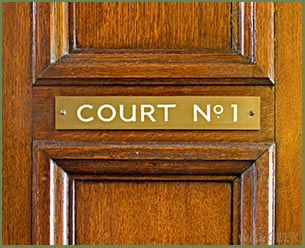By: David L. Crockett, Attorney, CPA
UCLA Law School , J.D. ’69, UC Berkeley ’66
901 Dove St., Ste 120, Newport Beach, CA 92660
By: David L. Crockett, Attorney, CPA
UCLA Law School , J.D. ’69, UC Berkeley ’66
901 Dove St., Ste 120, Newport Beach, CA 92660
People engage in estate planning to establish a comprehensive plan to cover what happens to their money and property in the event of disability or death or divorce. Each estate plan is custom tailored to your personal situation. A typical estate plan will:
1. be changeable (revocable);
UCLA Law School , J.D. ’69, UC Berkeley ’66
901 Dove St., Ste 120, Newport Beach, CA 92660
Typical situation. An elderly mom with two adult children, Sally & John, passes away with a house full of nice personal belongings (furniture, antiques, crystal and jewelry). Sister Sally lives with mom or in the same town and brother John lives 500 miles away. When mom passes, Sally notifies John but it takes him a couple of days to get into town for the funeral. Meanwhile, Sally picks through the personal belongings and takes for herself what she wants and doesn’t tell John about it.
What actually should be done but rarely happens. A Upon a death, the law requires that the deceased person’s personal property as well as money and real property be inventoried and accounted for. Whether it is a probate situation or a living trust situation (i.e. no probate because of there being a trust in place), somebody needs to pay immediate attention to the personal property within a day or two. It is a sad fact of life that I and nearly all other estate attorneys have observed that personal property often disappears without any trace unless steps are taken to preserve it. In the ideal situation, the entire house including the personal property is photographed immediately and then detailed lists are made, room by room, of what is there. Then, a personal property appraiser is hired to make a detailed listing of everything and appraise the values. Few people realize it, but there are professional appraisers. One resource is the American Society of Appraisers which can be found at http://www.appraisers.org/Disciplines/Personal-Property
What can be done to recover missing personal property? The short answer to this is that very little if anything can be done. This is the classic case of once the horse is out of the barn the remedies are few an ineffective. Theoretically, as in the example above, brother John can file a probate court petition against sister Sally but it is up to John and John’s attorneys to prove that Sally took the items in question. Unless there are photographs or written evidence created very close to the mom’s passing, John can’t produce evidence to prove (a) what the missing items were and/or (b) that mom still owned them at her death or (c) that Sally took the missing items. If John files against Sally she will typically deny any knowledge of anything. If it were money missing, then bank records can be subpoenaed to prove what money was taken and whose account it went into. Not so with personal property, unless the items are of significant value or are put up for sale in something observable such as Craig’s list. Because mom’s personal property is not typically on people’s minds in mom’s last days, not a lot of care or record keeping is done to keep track of what there is.
 Guardianships For Children – A guardianship is a legal status whereby an adult is given authority to take care of the person of a minor child and/or the estate of the minor child. A “guardianship of the estate” is where the Guardian has control and custody of assets, property and accounts belonging to a minor child. A “guardianship of the person” is where the Guardian is responsible for the care, protection, or custody and medical issues of a minor child. Guardianships typically arise in the unfortunate circumstance in which both parents have passed away. Guardianships may also arise where parents are unable or unwilling to care for their children.
Guardianships For Children – A guardianship is a legal status whereby an adult is given authority to take care of the person of a minor child and/or the estate of the minor child. A “guardianship of the estate” is where the Guardian has control and custody of assets, property and accounts belonging to a minor child. A “guardianship of the person” is where the Guardian is responsible for the care, protection, or custody and medical issues of a minor child. Guardianships typically arise in the unfortunate circumstance in which both parents have passed away. Guardianships may also arise where parents are unable or unwilling to care for their children.
 California law presumes that everyone has the mental capacity to make a will. Thus, if someone challenges a will in probate court for lack of mental capacity it is up to the challenger to prove lack of capacity with sufficient evidence.
California law presumes that everyone has the mental capacity to make a will. Thus, if someone challenges a will in probate court for lack of mental capacity it is up to the challenger to prove lack of capacity with sufficient evidence.
When a child turns 18 years he or she is considered to be an adult under California law. In legal terms, children under age 18 are called “minors” and when they reach age 18 they are called “adults”. Minors and adults are treated differently as far as inheritance rights are concerned. Minors still have rights to inherit but any inheritance which comes to them is subject to certain legal controls because the law presumes that minors are not capable of handling money or property as well as adults.

In California over the last few decades there have been some situations whereby attorneys or caregivers have had wills or trusts prepared that benefit them. There was a famous case of a 95-year-old lady whose will left the bulk of her fortune to the people taking care of her. It turns out that the people taking care of her, known as “care custodians” had the will prepared under suspicious circumstances such that the 95-year-old lady probably didn’t know what she was signing. This and other similar situations led to recent legislation to correct abuses.
 If a will or a trust does not make an equal division of the estate then an unhappy heir might want to make a challenge. The law does not require you to equally divide your estate equally amongst your children or to give anything to them for that matter. Most children or in some instances brothers or sisters where there are no children feel that they are entitled to an inheritance. Not everybody understands or believes that a person making a will or trust can leave his or her assets to anyone. This has led to litigation challenging the provisions of the will or trust.
If a will or a trust does not make an equal division of the estate then an unhappy heir might want to make a challenge. The law does not require you to equally divide your estate equally amongst your children or to give anything to them for that matter. Most children or in some instances brothers or sisters where there are no children feel that they are entitled to an inheritance. Not everybody understands or believes that a person making a will or trust can leave his or her assets to anyone. This has led to litigation challenging the provisions of the will or trust.

An Estate Plan Review Helps You Deal with Life Changes